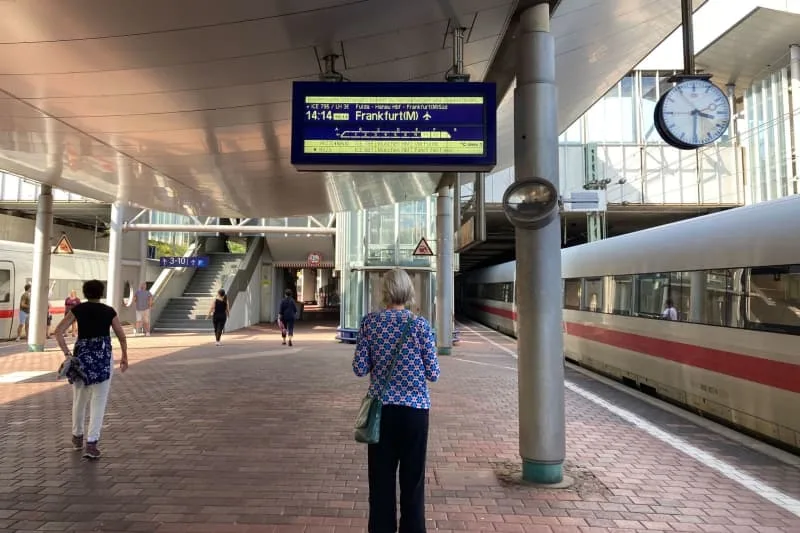In a significant disruption to Germany’s renowned railway network, a major IT glitch has caused widespread delays, leaving passengers stranded and frustrated. The Deutsche Bahn (DB), Germany’s national railway operator, reported the issue earlier today, stating that the glitch has affected the entire network, with long-distance and regional train services brought to a halt in several areas.
The Scope of the Glitch
The technical failure, which occurred during peak travel hours, affected the railway’s control system, which is responsible for coordinating trains across the country. Thousands of passengers found themselves stuck at stations or delayed mid-journey. The disruption extended to both major hubs like Berlin, Frankfurt, and Munich, as well as smaller regional lines, crippling Germany’s highly efficient transport system.
As one of the busiest rail networks in Europe, Germany relies heavily on its trains for both daily commuters and long-distance travelers. The glitch has not only impacted passengers but also freight services, causing significant delays in cargo shipments, adding to the growing economic consequences of the IT failure.
What Caused the IT Glitch?
According to Deutsche Bahn, the root cause of the issue lies in a software malfunction in its central control systems. The glitch disrupted communication between the trains and the railway’s control centers, making it impossible to monitor or manage train movements safely.
Although details about the specific nature of the technical failure remain unclear, it is believed that a critical software update may have led to the system crash. Deutsche Bahn has assured passengers that they are working around the clock to resolve the issue, though no timeline has been provided for a full restoration of services.
Passengers Left in Limbo
For thousands of commuters, the day started with confusion and frustration. In cities across Germany, train stations quickly became overcrowded as travelers waited for updates on their journeys. Some passengers reported delays of up to several hours, with little information provided by railway staff. “I’ve been waiting here for over three hours with no updates,” said one commuter at Munich Central Station. “It’s really frustrating, especially when you don’t know how long it will take.”
Social media platforms were flooded with complaints from stranded passengers, many of whom expressed concerns about missed appointments, business meetings, and personal events. “This has thrown my entire day off,” tweeted one traveler. “It’s not just the delay, but the lack of communication that’s really upsetting.”
Impact on Germany’s Economy
The widespread disruption has not only affected passengers but has also raised concerns about the economic impact on Germany’s logistics and freight industries. The German railway system is a crucial element of the country’s supply chain, transporting goods across Europe. With freight services halted or severely delayed, businesses are facing potential losses due to late shipments.
Economists warn that prolonged disruptions in railway services could have far-reaching consequences for Germany’s economy, which already faces challenges from supply chain disruptions and inflation. Some experts are also calling for Deutsche Bahn to invest more in upgrading its IT infrastructure to prevent future incidents of this magnitude.
A History of IT Glitches
This is not the first time Deutsche Bahn has faced IT-related challenges. Over the past few years, several technical failures have caused significant delays and service interruptions. In 2021, a similar IT failure led to major disruptions, though it was resolved within a few hours.
Deutsche Bahn has been investing heavily in modernizing its digital infrastructure, but today’s incident has highlighted the vulnerabilities in its IT systems. As Germany aims to promote more sustainable modes of transportation, including train travel, reliable technology is critical for maintaining public trust and ensuring smooth operations.
What’s Next?
Deutsche Bahn has urged passengers to check their website and app for the latest updates on the situation. In the meantime, travelers are advised to explore alternative transportation options, such as buses or rideshare services, to reach their destinations.
German authorities have also launched an investigation into the root cause of the glitch. Initial findings suggest that while human error has not been ruled out, the complexity of the software failure points to potential systemic issues that could require a broader overhaul of Deutsche Bahn’s IT systems.
The company is also under pressure to improve its customer service and communication during crises. Many passengers expressed disappointment over the lack of real-time information, with some calling for Deutsche Bahn to implement more efficient ways to update travelers during disruptions.
A Call for Change
The incident has prompted renewed debate over the state of Germany’s public transport infrastructure, particularly in the wake of ongoing modernization efforts. Some industry experts believe that Deutsche Bahn needs to prioritize cybersecurity and IT resilience, particularly as digital systems become more integrated into railway operations.
Germany’s rail system is considered one of the most advanced in Europe, but frequent technical issues like today’s glitch have raised concerns about the efficiency of its modernization efforts. As climate-conscious governments push for more train travel, ensuring the reliability and safety of digital systems will be essential in achieving these goals.
As Deutsche Bahn works to resolve the IT glitch and restore full service, passengers are left dealing with the fallout of a system that, for now, appears vulnerable to technical failures. This incident serves as a wake-up call for the need to invest in robust, fail-proof technology to ensure that Germany’s railway network remains a reliable mode of transportation for both passengers and freight.
For more updates on global transport developments and IT infrastructure, visit Digital Digest, your go-to source for the latest tech news.







